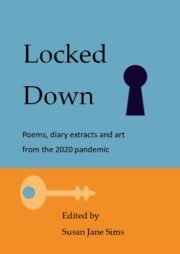Welcome to the first of a series of fortnightly writing prompts that I hope will inspire you to write poems.
I will select up to ten submissions for the website from each prompt, however there won’t be any voting this time. Instead if you have enjoyed the poems and want to send in feedback for the poets this is welcome.
Also poems from each workshop will not be archived online and will only stay online for two weeks. This should enable poets to submit resulting poems to magazines and competitions if they wish to at a later date though if in doubt check the rules with editors and competition organisers.
The deadline for sending in poems from workshop one is Saturday 5th November.
Workshop One
For this first prompt I want to take you back to a very early memory. I suggest sitting somewhere quietly and thinking about yourself at different ages. Maybe your first day at school? Or perhaps first day at nursery? Maybe your first memory is of a little brother or sister in your life. How did that feel?
The memory may be unpleasant, you may remember being hurt. or you may recall hurting someone or something else.
What was the place you lived in like? Some concrete detail will bring your poem to life.
Here is my own poem on this theme.
Creation Story
In the beginning
there was the cool touch
of a flagstone floor.
Baby soft feet.
And then a big brown bowl
and a swallowing up.
A lap’s crazy heat.
Soft petals. Wet cheek.
Mum dead heading roses.
Susan Jane Sims
This appeared in Obsessed with Pipework magazine in 2009 and in 2010 I published it in my pamphlet collection Irene’s daughter.
The event was falling over a bowl in the kitchen of the old rented cottage in which we lived. In the poem I have chosen to concentrate on the sensations; soft petals, wet cheek in order to paint a vivid picture economically.
Take a look too at My Papa’s Waltz by Theodore Roethke.
————————————————————————————————————————————-
I have selected just a small sample from the poems that came in from workshop one. I was pleased to hear that so many of you enjoyed this first prompt and I have gained so much from reading all of the poems even if I have not included them below. My comments are below each of them in italics. If you have further feedback please it in.
Poets featured are Lizzie Ballagher, Alwyn Marriage, Angie Butler, Denim Deka, Shirley Wright, Johanna Boal and Leela Gautam.
Before Words
Before there were words,
Before trees & flowers & birds
Had names
And under morning’s first holy light,
I played below juniper trees
In dry brown dust where no rain fell.
Then scrambled out
To where my mother bent, planting lupins
In the fine damp loam
A rake’s length away:
Lupin leaves studded with rain beads
At their hearts.
I had no words, no names
For the soft rosettes of leaves
Or the junipers’ incense:
Just the wonder of diamonds on greenness,
With trees’ fronds brushing my face—
The heaven of their scent floating around me.
Some say
We have no memory
Until we have vocabulary.
And yet, a mystery:
Before words,
I do remember.
Lizzie Ballagher
I have a baby nephew who is babbling but not yet speaking and it is interesting to contemplate what goes on in a child’s mind before they have words to describe it themselves. Lizzie, you have evoked the feeling of being small and living in a world without words but one of strong sensations. I love the line, “lupin leaves studded with rain beads”. With, I imagine deliberate use of religious language the scene you depict becomes a garden of Eden with everything being explored for the first time.
Remembering Legs
Dad’s went on for ever,
long and thin, rising like pillars
into the great unknown.
A humble Colossus, he bestrode
the threadbare carpet, swooping down
from time to time to lift me,
show me the universe outside
dusty net curtains.
His trousers were my climbing frame,
a safety blanket, a welcome cuddle
for my toddler cheeks as I breathed
the whiff of sweat mixed with tobacco
and engine oil. Their rough cloth
wiped my snot. They were my strength
as I tottered, the warmth
I clung to when the room felt cold.
Occasional gods, his legs
were weekend visitors, off early,
back late, busy ruling the world
and bringing home small treats on a rusty bike;
a bag of sweets, chocolate
dangled from on high. No matter
how tall I grew, they surpassed me.
Shirley Wright
Shirley, I love the concrete detail in this piece, and the fact that this is a portrait of someone real, whose sweat is “mixed with tobacco and engine oil”, who wears trousers made of “rough cloth” and who has the power and strength to lift you from the floor to window height to see the world outside. The world of the toddler is reimagined wonderfully through the theme of legs. Legs to grab hold of, legs to climb up, legs to wipe a snotty nose on.
Hollow Echoes
Delving into the darkness
of the past, I walk the path and see
glimmers of moon light through arched windows.
Taking his hand, I follow my father’s
footsteps through hollow echoes of pews.
Smell musty hymn books,
and candle wax,
Chrysanthemums,
Harvest fruit piled in
window sills of cleared cobwebs.
By day, these windows are
full of colour,
and I feel the warmth
of the sunshine
in the rich, story eyes of my childhood.
I hear the keys he made
sing, sending out
powerful notes, deep and rich,
to rock the unbelievers
and lure them to join in, sing, praise and rejoice.
But the moon,
gives me a chill today,
without his hand,
a loneliness and empty sadness,
in the dark, coldness of the night.
And the days, though bright,
will for ever miss his warmth.
And the music holds no meaning,
just a hollow echo,
of a life without his sharing love.
Angie Butler
This is another evocative poem of a father remembered through colour, smells, sights, sounds. There is a sense of pride here and and overwhelming sense of loss. With perfect synchonicity the hollowness of the building becomes the hollowness of a life without this man.
Liquorice
It’s difficult now to understand
which rules we happily broke as children
and which were sacrosanct;
or why it was taken for granted in our family
that a semi-biblical proscription against shopping
on the sabbath was one we should never break.
On a visit to farm friends one Sunday afternoon
we children set off across the fields in innocence,
– patted ponies, jumped across a stream
and practiced the occasional vault across
a five barred gate, – then having crawled through
a tangle of hedges slipped unseen into a sweet shop.
Our friends thought nothing of it, couldn’t
understand my nervousness or the thrill
of such a serious misdemeanor.
My pocket money paid for seven straps
and coils of liquorice, long as a lie
or convoluted as an alibi.
This was my earliest visit to the tree
of the knowledge of good and evil
and the first fruits made me wary
of the eyes of passing strangers
that might become the eyes of neighbours
who would know, even if they never told.
The liquorice was chewed and swallowed
quickly as we crossed the fields again:
it tasted dark and black and sweet as sin
in the way that nothing ever has since then,
so that years later, a slight murmur of guilt
still trembles at my enjoyment of the taste.
Alwyn Marriage
As children we are often stuffed full with rules and it can feel very daring to break them. Both the excitement (the liqourice was “dark and black and sweet as sin”) and the guilt (“seven straps/and coils of liquorice, long as a lie/or convoluted as an alibi”are explored in this poem. I almost felt that I was tasting this candy as I devoured the poem.
On a train
I was two ,almost three,
On that train going somewhere.
Mother with baby,
Me on daddy’s knee,
looking down,down,
I see tiny houses
As fields flash by.
Tiny people,walking ,waving;
Animals so tiny ,I could hold them.
I cry,
Daddy,daddy,I want one for me,
“What?”he asks,
He’s reading,
He looks,too late he doesn’t see,
Oh no,the train’s moved on,
It’s gone!
But it stays in my dreams forever.
I grow,I read Tales from Gulliver,
Of Lilliput men and women,
I know they are real,
I’m a believer,
I saw them from that train then,
When I was
two,almost three.
Leela Gautam
The view from a train window must seem like another world to a small child, especially as it appears and disappears as the train moves. I really like how you have captured this Leela and refected on it now as an adult. This feels like an important memory for you, one that helped you to believe in a world beyond yourself, a world of fantasy, of stories and fairy tales. There is a tinge of sadness here too, of the child wanting to share a moment and the father missing it.
A Day Out In The 70s
The Perspex bus shelter doesn’t gleam like glass, it’s grubby
fits in with the orange bus screeching brakes pulled up
puddles from the April showers splashed about its wheels:
It’s taking us to meat street market – where animals are slaughtered.
We are buying lacy material for the Holy Communion,
to be brides of Christ, feasting on bread and wine (but I would
prefer a feast of chips, sausages and cream cakes)
whilst wearing white and blue – an act of defiance, from mum!
Will the congregation see the daisy edging on my little white veil?
Some seats upstairs torn, yellow sponge exposed, the same
yellow in the Rupert Bear annual a boy from my class is reading.
The driver is turning corners at such speed, maybe he watches Formula 1
crashing us into windows, the stand-up poles, and how my sister
giggled, sliding on the bends to shove me into those corners.
A bus ride with mountains in the distance, fields, smell the petrol fumes,
see a rope swing hanging from a lamppost, a football match in the park,
houses on top of each other, dogs fighting, phone boxes, pavements,
hills with children playing on bikes – look no hands on the handle bars.
Johanna Boal
You give a wonderful glimpse of family life here Johanna. Lots of detail on this very important bus ride to buy lacy material for a holy communion veil. I am left wondering why your mum (Or the narrator’s mum) is feeling defiant. Does she not want her daughter to be confirmed as a catholic? This is an interesting poem, covering a lot of ground.
Morning Routine
Rays of the rising sun
Falling into her hair bun,
I see mother by the tube-well
And wash dirt as the utensils tell.
Monkeys scampering in the tin -roofed house
From the deep morning sleep, I am roused,
Cajoled by the sun to wake up
Wash, brush and take the milk cup
Night-flowering jasmines in the green meadow
I look at them from the kitchen window.
To school, shoulder with its magnet escort, the ‘bag’
Footsteps ready to trot like a tail’s wag
Mother’s humble lessons to be polite
I understand to remain bright.
Roots of the childhood heart
Play its part
Empty wind swaying across it
Boredoms, sulks get frivolous hit.
-Denim Deka
This is a portrait of a mother seen through the eyes of the child. As I read this I could feel the heavy weight of duty being placed upon the child. Some beautiful detail sets the scene, “mother by the tube-well”, the “Night-flowering jasmines in the green meadow”.







